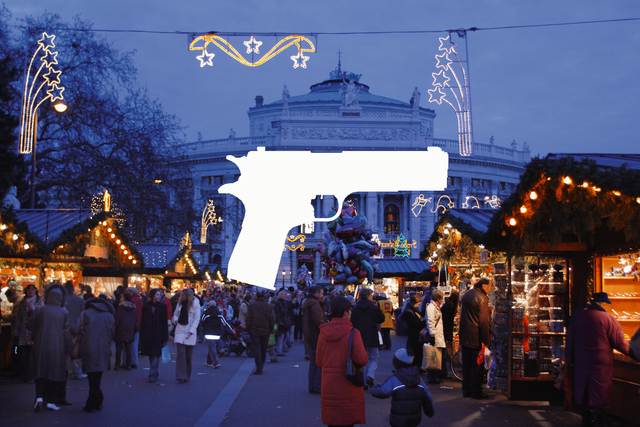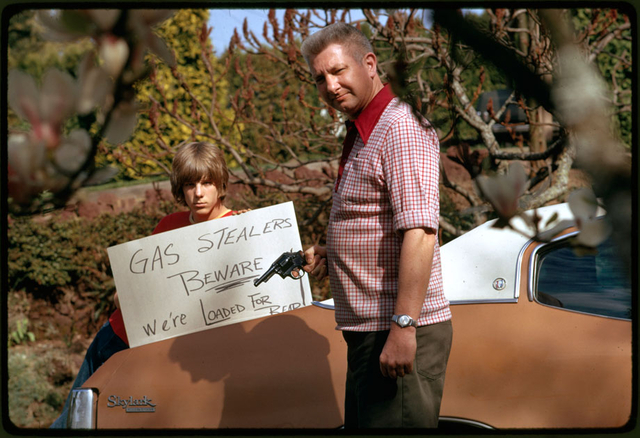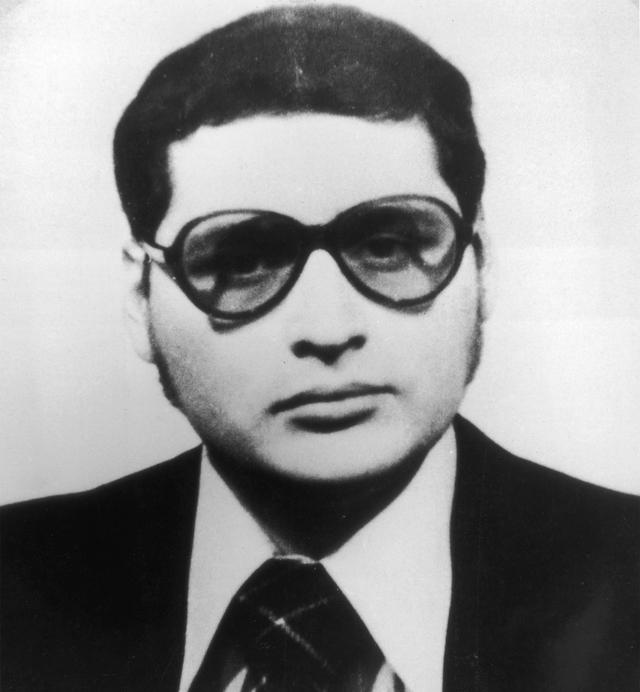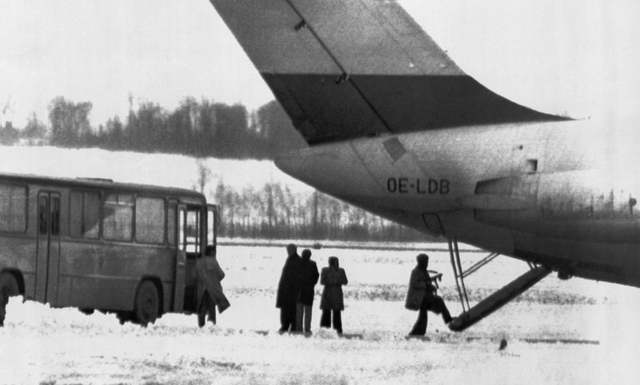First Day of Terror

A winter day in Vienna when the world’s most powerful oil barons stared down the barrel of a gun. City of Vienna
Carols echoed through the Christkindmarkt in Vienna on the morning of December 21, 1975. The sky was overcast, and trees stood leafless in the neighboring parks. The edelweiss flowers adorning many of the stalls and shop windows were past their bloom, and their petals and leaves had begun to crumble.
Shoppers and stall-minders alike—transfixed by the edelweiss, roasting chestnuts, mulled wine, and gingerbread—paid little mind to the building across the street. That concrete-and-glass rectangle, shared by the Organization of Petroleum Exporting Countries and the multinational oil giant Texaco, was one of many drab and unassuming buildings that had popped up amidst the grandeur of Austro-Hungarian modernist buildings and parks. But if the architecture was neither eclectic nor unusual, the moment that would soon face its occupants was. As six casually dressed young people carrying black Adidas bags turned the corner and began to approach the building, the oil ministers from Saudi Arabia, Iran, Iraq, Venezuela, Libya, and Algeria had begun another round of discussions about the price of oil. Their meetings had been headline material for over two years, since October 1973.
That month, the Egyptian army had thundered across the Suez Canal while Syrian troops stormed into the Golan Heights in a coordinated attack on Israel. They acted with Saudi Arabian, Iraqi, Kuwaiti, and Libyan financing, as well as Algerian, Tunisian, and Moroccan material support. Soviet leaders expressed frustration that Egyptian President Anwar Sadat had disregarded their counsel against war, but immediately began to resupply their “Arab brothers.” Ten days later, after Sadat refused a cease-fire, the Nixon administration announced a multi-billion dollar arms lift to Israel. The Arab members of OPEC hastily convened at the Kuwait Sheraton. They announced the imposition of an oil embargo on the United States, general supply cuts, and a 70-percent increase in Persian Gulf oil’s posted price, from $3.01 to $5.11 per barrel. The non-Arab OPEC members immediately followed suit. For the first time in their history, the oil-producing nations had set the price of oil.
According to its more radical personalities—men from Iraq, Algeria, and Libya—OPEC had thrown off the imperialistic shackles imposed upon them by the multinational oil companies in the first half of the twentieth century. When OPEC successfully increased prices fourfold between October 1973 and January 1974, its most vocal leaders framed their success in the language of liberation from what former Saudi oil minister Abdullah al-Tariki called “petroleum colonization.” Algerian President Houari Boumediène emphasized the “new equilibrium between developed and developing states” and the possibility for “non-aligned [countries] to assert greater control over their natural resources.” The Third World could not allow the First “to establish a protectorate” over the new economic order as it had the previous one, he told a reporter at Le Monde. More conservative, pro-American leaders echoed that sentiment. “It is only equitable and just that the oil producing countries” had ended the era in which oil sold “at ridiculously low prices,” the Shah of Iran opined from the steps of the OPEC headquarters in December 1973.
The West owed the rest a debt. That position had some truth; the biggest and richest oil concessions in the world had been granted in the high era of imperialism, when gunboat diplomacy had backed Western corporate executives in their quest to wrest wildly profitable terms from their weak Middle Eastern counterparts. An oft-cited example, the 1925 oil concession to Iraq, had only been granted when Britain had threatened to lop off the oil-rich province of Mosul from the rest of the country. That vision of an imperial economic hangover resonated broadly with nationalists across the “Third World” of former colonies and other poor nations. The shared history of exploitation, formal or informal, had left a backlogged legacy. “Economic emancipation,” to use a phrase that became common among the leaders of the Non-Aligned Movement, had become essential to the ongoing struggle to eliminate political domination.
At a Special Session of the United Nations in April 1974, the representatives of the developing nations universally supported OPEC and condemned “the current structure of economic relations.” The ruthless dictator of Uganda, Idi Amin, summarized that position a year later. The moves of OPEC were part of a greater attempt at “the restoration of full economic rights to the hitherto exploited, oppressed, and enslaved peoples of the Third World.” The end of formal colonialism was but a single step in a longer journey. “The world-wide war for self-determination and political independence is almost over now, but the struggle for self-reliance continues,” he continued. “The present stage in this struggle is for economic independence.”
The images of an enslaved past and a liberated future had bewitched the imaginations of Third World elites of all stripes since the 1950s. OPEC had turned upside down the economics of empire, and pushed back the forces of the past. The OPEC leaders shined that point to rhetorical perfection in their public statements. According to them, the oil-producing nations had infused the striving rhetoric of political liberation into a vast domain of economic life. Their control over the price of oil was testimony to their success.
But rhetoric flattened reality on both the national and international level. The Iraqi, Iranian, and Ugandi leaders sang no paeans of freedom at home. Neither did the struggle of the oil-producing nations exist in a global vacuum in which the imperial past was the only concern. The rise in oil prices, for example, also fed a narrative of decline among the leaders of the industrialized West. In a national television address, French President Georges Pompidou nostalgically likened the advent of what Western officials called “expensive oil” to “waking up from a too beautiful dream.” The change was so great for U.S. President Gerald Ford that he would compare the potential for U.S. “energy independence” to the 1776 American Revolution in his bicentennial State of the Union message. The energy crisis threatened to cause “the moral and political disintegration of the West,” U.S. Secretary of State Henry Kissinger told visiting diplomat after visiting diplomat. In those circles, the oil producers were vilified as the evildoers that caused the widely-proclaimed energy crisis. Officials from the United States and Western Europe consistently railed against the producers as “irresponsible,” “irrational,” “destructive,” “demagogic,” and even “theological.” That dramatic dialectic identified “OPEC unilateralism” as an illiberal bogeyman, a negative counter-image of the free market.
Above the different strands of political interpretation and posturing, the price of oil remained stratospheric. It stood at around $13.00 on that day in Vienna in December 1975, more than quadruple its price before the October 1973 war. The consequences of expensive oil for the “non-oil producing world” continued to be many and far-reaching. Oil import bills piled up for developing nations, throwing askew the plans for economic growth of a generation of Third World leaders. The non-OPEC nations where there was oil, most prominently Mexico and Brazil, invested heavily in its extraction. The Soviet Union, a rickety state with a dismal economic future, reaped a sudden bonanza from the profits of their oil exports. Western states promoted energy conservation and the production of “traditional alternatives” like coal and shale, and environmental movements faced off against renewed popular support for those less expensive but dirtier sources of energy.
Even the multinational oil companies, whose shareholders benefitted handsomely from the price increases despite being international poster boys for anti-imperialist derision, were not immune to the consequences. Texaco and the other American giants were under attack in U.S. Senate hearings for reaping unfair “windfall profits” from the price increases as they passed on the cost to the average consumer. One commentator called the oil companies “tax collectors” for OPEC. “I blame the major oil companies,” a grocery store owner in Miami said. “I think they used the Arabs as an excuse to raise prices.” The New York Housing Authority and the Lefrak Corporation, the largest private landlord in New York City, even brought suit against the multinational oil companies for unduly passing costs onto the consumer.
When Ahmed Zaki Yamani, the Saudi Oil Minister, awoke early that morning, he showered, parted his thinning black hair sharply on the side, donned his usual tailor-made suit, knotted his silk tie in a double windsor, and left the warm confines of the Vienna Hilton. Upon his arrival to OPEC Headquarters, he engaged in the usual pleasantries with his counterparts and then began discussion on the relatively minor issue of price differentiation between different sources and qualities of crude.
Outside in the foyer, the OPEC receptionist sleepily answered a phone call. When she looked up from the switchboard, two young men stood in front of her. One wore a fur hat and held a pistol. The other was a middle-aged man of average height, broad through the shoulders, and narrow between the eyes. He wore a beret, tan pants and a leather jacket that fit him snugly, brown shoes, and trench-coat. A black submachine gun lay comfortable in his hand, not pointing at anything.
“Where is the conference room?” he asked. The receptionist glanced in that direction, grabbed her telephone, and ducked beneath the desk and dialed the police. The man in the fur hat leaned over the desk and pointed his pistol at her head. He then shifted his aim and shot the telephone and the switchboard. More shooting started. Within minutes, the two men and their accomplices had killed three people.
Upon the first shots, Yamani and the other ministers dove to the ground. Sporadic bouts of gunfire, and then an explosion, rang out as they trembled on their hands and knees. The ministers heard glass and tile fall in the corridor outside the conference room, clattering like marbles on the hard floor. Another round went into the ceiling, Texaco’s floor, and then an explosion. Running footsteps came closer and closer.
And then, for a brief moment, silence. The first terrorist burst into the room and covered the cowering ministers. A second terrorist joined the group, breathing uneasily.
“Have you found Yamani?” he asked out of that heavy nothingness.
Yamani “became yellow to the extent that no one could have imagined that there was any blood in his face,” the Libyan oil minister later joked to reporters. Never taking his eyes off the man who had spoken, Yamani crawled from under the conference table, stood up, and raised his hands in front of him, as though to placate his unknown adversary.
Yamani told a Saudi television crew that his initial thought at that moment was that the group was comprised of “European terrorists” come to “avenge themselves” for the havoc high oil prices had wrought on the international economy. He couldn’t have been more wrong. Frontiers are places of constant contact, and few are more permeable than those of political imagination. But the frontiers between the oil producers and the oil consumers, between the OPEC ceiling and the Texaco floor, between imaginary terrorists and real ones, were not the only ones that the bullets would cut across that morning. As Yamani and the unknown assailant stared at each other for the first time, both knew that long-running tensions also existed within OPEC itself.
Since the founding of OPEC in 1960, deep internecine suspicions among its members had bedeviled the organization. Yamani had been a lightning rod for controversy since assuming the direction of Saudi oil policy in 1962. He had begun his consistent habit of irking the more radical oil ministers almost immediately. In the first official negotiations between OPEC and the multinationals between 1962 and 1965, on the topic of royalty expensing, Saudi Arabia and Kuwait sided with Iran rather than Indonesia, Venezuela, and Iraq. The Kuwaiti legislature had rejected the agreement, one legislator calling the multinational corporations’ negotiating strategy as “threats laced with a bribe.” A year later, he hadn’t wasted any time toadying up to the multinational corporations, according to his critics. Then he backed crab-like into the concept of “participation,” or partial national ownership, as a moderate alternative to the nationalist calls coming out of Iraq, Algeria and, increasingly, pre-Qaddafi monarchical Libya. In a speech at the American University in Beirut that year he described the bond between the oil companies and the producing nations as “indissoluble, like a Catholic marriage.”
But Yamani also played a pivotal role in consolidating the power of OPEC to raise prices since then. In a 1968 speech he described oil company executives as “obsessed with the empire they have built.” Between 1970 and 1973, he consistently pushed for greater supply and price control for Saudi Arabia, often in conjunction with the more radical oil ministers from Libya, Iraq, and Algeria. The American embassy reported that under his guidance Saudi Arabia and Algeria had become “strange bedfellows of Arab geopolitics.” Yamani and his Algerian counterpart had become de facto spokesmen for the oil producers, playing “a lead in asserting … the need for producing countries to play a greater role in the destiny of the oil industry.” When the Algerian president called for an unprecedented Special Session of the UN General Assembly to discuss “economic colonialism” in April 1974, Yamani echoed the sentiment and the language when he told Kissinger that the United States should not try to establish a “trusteeship” over oil prices.
Yamani often explained his position in other terms. “Saudi Arabia would leave the running to Libya and Iraq,” he told one American official. If these countries received higher levels of participation, “Kuwait and Saudi Arabia could not be seen to be lagging far behind.” But the result was the same. As Yamani became more intransigent in the early 1970s, he set a hard floor for the dialogue. That a conservative ally in the Cold War did so was important. He would never assail neocolonialism, but neither would he allow the oil companies to retain control over oil that rightfully belonged to Saudi Arabia. It was a matter of fact that “new winds were now blowing,” he told the American ambassador, “as marked by Algerian action, and Libyan and Iraqi attitudes.”
Yamani explained the gulf between Saudi Arabia and the radicals in terms of their political sameness. This was anti-colonial talk. Such a statement struck an ultra sovereign note, and could have been lifted directly from the Algerian or Libyan oil ministers at their most sulfurous.
This later led Kissinger, no novice at playing the martyr, to single out the “feckless and gutless Saudis” for particular derision. Many observers of the Arab world and the international oil scene also saw Yamani as hypocrite. For them he was the most thinly veneered plaster saint, his anti-colonial rhetoric nothing more than an outward form of piety. Whether or not Yamani spoke with conviction mattered little in December 1975, because his critics conveyed one thing quite unambiguously: he might have been an integral part of OPEC’s recent success, but he was not to be trusted.
The still-unidentified intruders divided their hostages into three groups. The ministers from Iran, Qatar, and the United Arab Emirates joined Yamani as “criminals.” In the “liberals and semi-liberals group” stood the representatives from Iraq, Libya, Algeria, and Kuwait. The non-Arab members, except Iran, joined the “neutralist group.” The leader of the assailants then told the ministers in an accented Arabic that they were Palestinian commandos.
So that was it. The disputes between the different oil-producing nations had jaggedly crossed paths with an intra-Arab dispute about how to deal with Israel since its independence in 1948. Weeks before the June 1967 Arab-Israeli war, Egyptian President Gamal Abdel Nasser told the Arab public that “all weapons must be used in this battle; whether by governments or by the people.” The leaders of Arab labor unions immediately called on their workers to “destroy the oil sources, pipe-lines and installations from which the enemy could benefit.” The implicit and explicit threats effectively dragooned the oil-producing monarchies of Saudi Arabia, Kuwait, and Libya into support of an Arab oil embargo. Each understood that their population would tolerate no actions short of oil withdrawal in the case of war. “Any Arab leader who refused to do so would risk literal as well as political assassination,” the American ambassador in Cairo wrote.
After the Arab-Israeli war ended, a public quarrel occurred between Yamani and Tahir Yahya, the Prime Minister of Iraq. Yamani told the Financial Times that if the embargo continued the Arab world “stood to lose as much economically as they had already lost territorially,” a public position that U.S. Secretary of State Dean Rusk welcomed as evidence of Saudi “enlightened self-interest.” The New York Times reported, “The Arabs, as usual, had a proverb to fit the situation. Rahet al-sakra; waijit al-fakra.” The newspaper slickly translated the couplet: “Gone the wine fumes; thinking resumes.” A different rhyme applied in Iraq. Yahya responded by accusing the Saudis of deserting the Arab cause. Al Ahram, the influential daily newspaper in Cairo, called the Saudi pronouncement a “shameful act.”
A meeting of Arab heads-of-state in Khartoum settled the rift in August. The resultant communiqué is most famous for its “three noes”—no peace, no recognition, and no negotiation with Israel—but it had other consequences. Saudi Arabia, Libya and Kuwait would pay $378 million of reconstruction aid per year to Egypt and Jordan. In return, the producers received approval to resume oil shipments to the West without accusations of betrayal. The Khartoum payments soon began to go directly to the Palestinian groups and became their central means of financial support, according to reports from American embassies, the CIA, and the Near East Desk of the State Department.
At the same time, Palestinian guerrillas had become the “popular symbols of defiance of Israel” throughout the Arab world, as the authors of an April 1968 U.S. National Intelligence Estimate wrote. Moreover, the “new breed” of guerrillas subsisted not just on the Khartoum money, but also on the “heavy financial support … from well-to-do Palestinians and other Arabs in the oil-rich states.” Arab oil-producing states—led by Iraq and Libya, but followed by Saudi Arabia and Kuwait—expanded their funding afterwards to the extent that American officials believed the increased petroleum receipts of the Arab world would counteract their attempts to marginalize pro-Palestine “radicals.” The State Department concluded that it was likely that official and unofficial Saudi subsidies would increase despite the Palestinian groups’ new turn towards hijackings and kidnappings. “The exploits of the fedayeen … remain the favorite topic of the Saudi media,” the U.S. embassy reported. “There was no noticeable slackening in public support for the commando cause.” The international strategies of pro-Palestinian groups were the objects of widespread sympathy. Prince Fahd, the Saudi Defense Minister, announced a 50,000 riyal personal gift to the “families of the martyrs cause” in June 1970.
But sympathy and personal gifts were not enough. The September 1973 taking of hostages in the Saudi embassy in Paris evinced the boldness of nationalists acting outside the region, as well as placing on display the often contradictory relationship between oil power and the movement for an independent Palestine. It also sent a message: Saudi Arabia would increase what American officials called the Khartoum “insurance policy” one way or another. But the Saudi decisions in 1974 and 1975 to lift the embargo and put a cap on the price of oil had angered Palestinian nationalists.
The leader of the raid transmitted his demands. A bus with darkened windows would arrive outside at 7:00 a.m. the next day to take them to the airport, where a crewed airplane would be waiting. He also passed on a manifesto to be broadcast on Austrian radio and television every two hours, beginning at 4:30 p.m. The eight-point document combined the Palestinian cause with the calls for the nationalization of petroleum. It reads in part:
Reaffirmation of the three fundamentals of the 1967 Khartoum Arab summit: no treaty with no negotiation with, and no recognition of the state of Zionist aggression. Denunciation of all compromise and all political plans aimed at destroying this anti-capitulation plan and aimed at giving tacit or explicity legality to aggression from any part of Arab Palestinian land … . The declaration of the principle of full sovereignty over “our” petroleum and financial wealth through the nationalization of petroleum monopolies and the adoption of a national petroleum and financial policy which will enable the Arab people to use its resources for its development, its progress, the safeguard of its national interests and the strengthening of its sovereignty alongside the friendly people of the third World so they can emerge from their economic stagnation, on condition that priority be given to financing the confrontation countries and the Palestinian resistance.
If the demands were not met, he would begin to kill OPEC ministers.
The leader of the raid then began a kindly conversation in Spanish with the Venezuelan oil minister. Yamani’s discovery that his captor was “the well-known leftist terrorist” Ilich Ramírez Sánchez, better known as Carlos the Jackal, was unnerving. Just the previous summer, the French government had unearthed a detailed plan for Yamani’s assassination in a raid on the Jackal’s Paris hideaway.
The Jackal turned to Yamani, who stood separately from the group. As members of his team wired the room with explosives, he took Yamani’s arm and walked him down the hallway into an office. The office was bare except for a few binders on a shelf. The room was filled with shadows. The men sat down and Carlos screwed his dark brown eyes at the wall. His voice was solemn when he shifted his focus to Yamani’s face.
He would make an example out of Yamani to protest the policies of Saudi Arabia. If the Austrian government failed to have his statement read on the radio, he would be executed and his body would be thrown into the street.
Yamani stared back. Carlos rocked back in his chair and smirked for a long silent moment. Surely Yamani would bear no ill feeling against his killers, he continued. A man of his intelligence recognized the basic integrity of the cause. Carlos laughed, but his eyes remained hard.
Yamani asked, “How can it be that you tell me that you will kill me and then ask me not to feel bitterness to you?”
Carlos twisted his face towards Yamani and responded. “So far as you are concerned I am just making you aware of the facts,” he said. His eyes darkened, at first in a measured way, but then more and more viciously. He scowled now, his malice or cruelty or whatever moral void confronting Yamani as if through a mask; the hard face of a man who woke up each morning with a longing that seldom found indulgence.
Carlos scratched his hairline and wrinkled his forehead, as if to think. But he didn’t continue. He rested his arms across his forehead and looked up at the ceiling. After a moment or two of silence, he stood up and told Yamani to do the same. He then motioned Yamani back to the conference room.
Later that afternoon, his hand caught Yamani’s arm. It was cold. He leaned even forward with a smile and methodically spaced his words. “Remember our conversation,” he said softly. The sentence fell into the air like a hammer.
The sun dropped ever closer to the horizon, the sky gray behind the slate buildings and the empty stalls, and the streets were filled with police cars. Outside the reach of their flashing lights, the city’s Habsburgian splendor darkened and became indistinct.
Austrian Chancellor Bruno Kreisky agreed to supply the plane and have the statement broadcast, and Carlos set about finding food for the hostages and his crew. After he rejected an order of one hundred sandwiches from the Austrian authorities because they had ham, the Hilton sent over the food from an OPEC banquet planned for that evening. Most of the conference room lights had been shout out, so the hostages and the kidnappers dined by candlelight.
At some point that night, sleep came to the oil minister. Then, in front of the Christkindmarkt at 7:00 a.m. on December 22, 1975, the bus to the airport rounded the corner. The rising sun flashed off its windows like the blinking eyes of Argus.




